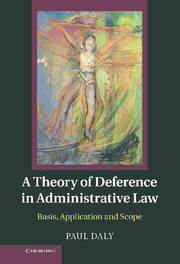Public law theory | Page 3
Canada’s Bi-Polar Administrative Law: Time for Fusion
Canadian judicial review of administrative action is structured around two poles: substantive review and procedural review. On matters of substance, the administrative decision maker is generally accorded deference by the reviewing court. On matters of procedural fairness, the court accords no deference, and determines the “correct” process. The author argues that this distinction is indefensible […] Read more
Internal Appellate Review: the Role of the Refugee Appeal Division
Guidelines and Assisted Suicide
Supreme Court not likely to entertain an appeal after Rob Ford wins his appeal on a ‘technicality’
Canada’s Least Wanted: The Two Perspectives of the Administrative Lawyer
Abstract Taking a leaf out of a book first written by the FBI, the federal government has tasked the Canada Border Services Agency with the preparation and maintenance of a ‘Most Wanted’ list. The CBSA list bears some resemblance to that of the FBI: on it feature individuals, complete with photographs and short biographies, judged […] Read more
La destruction des données du registre des armes d’épaule : le droit criminel et le fédéralisme coopératif
Referendum-itis

A Theory of Deference in Administrative Law : Foundations, Application and Scope
In the modern administrative state, hundreds if not thousands of officials wield powers that can be used to the benefit or detriment of individuals and corporations. When the exercise of these powers is challenged, a great deal can be at stake. Courts are confronted with difficult questions about how to apply the general principles of […] Read more
Blown Out of All Proportion: the Case Against Proportionality as an Independent Head of Review
Law and Outsiders is a collection of essays examining cutting edge developments in law. Thirteen essays from leading young scholars cover five important areas of legal scholarship: adjudication, European law and politics, migration, vulnerable minorities, and legal values. The recurring theme in the volume is the way in which rules and processes are contributing to […] Read more
Deference on Questions of Law
Abstract Contrary to the modern English position, it may be appropriate for reviewing courts to accord deference to interpretations of law rendered by administrators. There is no basis for the current strong presumption against according such deference. It is possible that the legislature intended to delegate the resolution of many questions of law to administrators, […] Read more